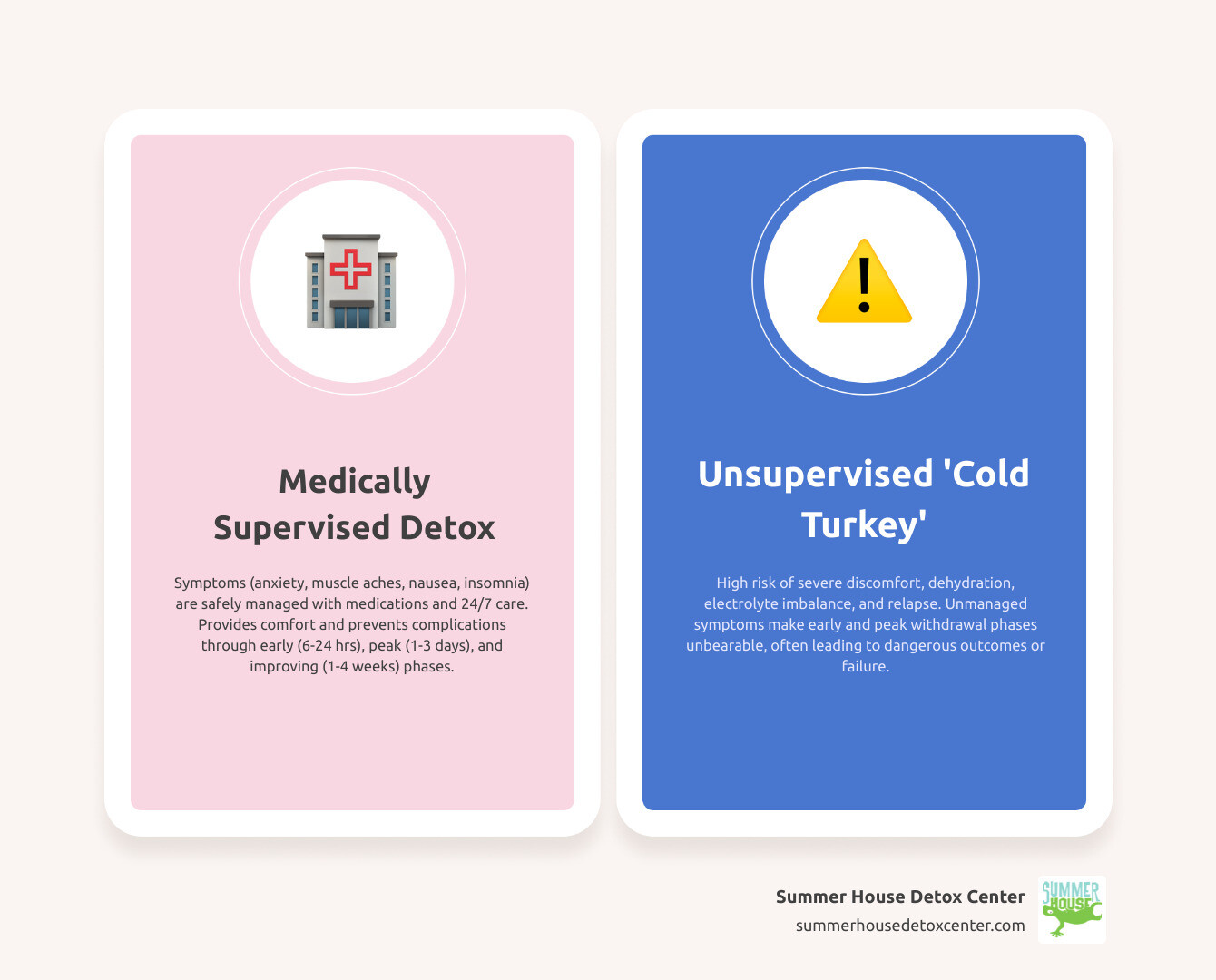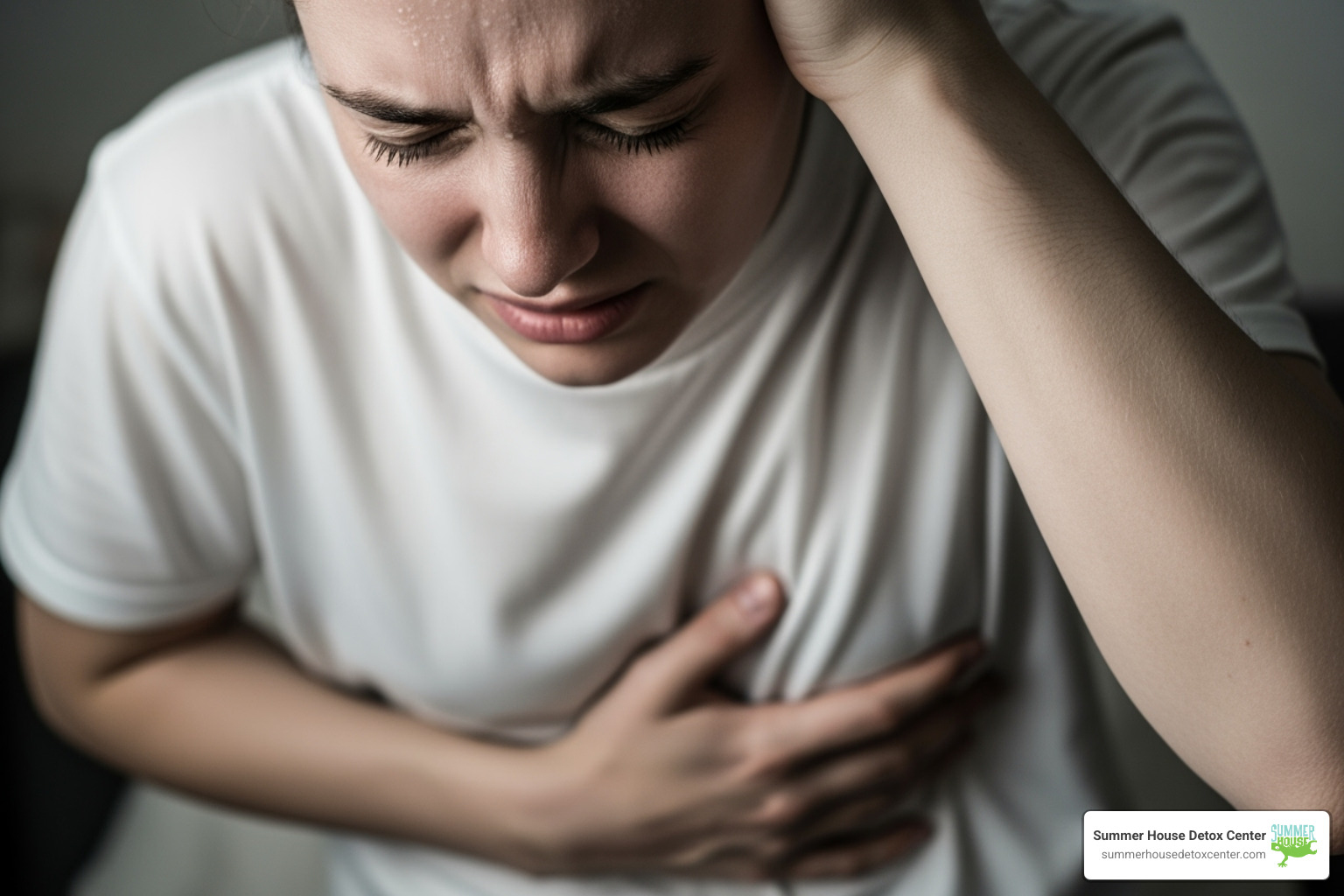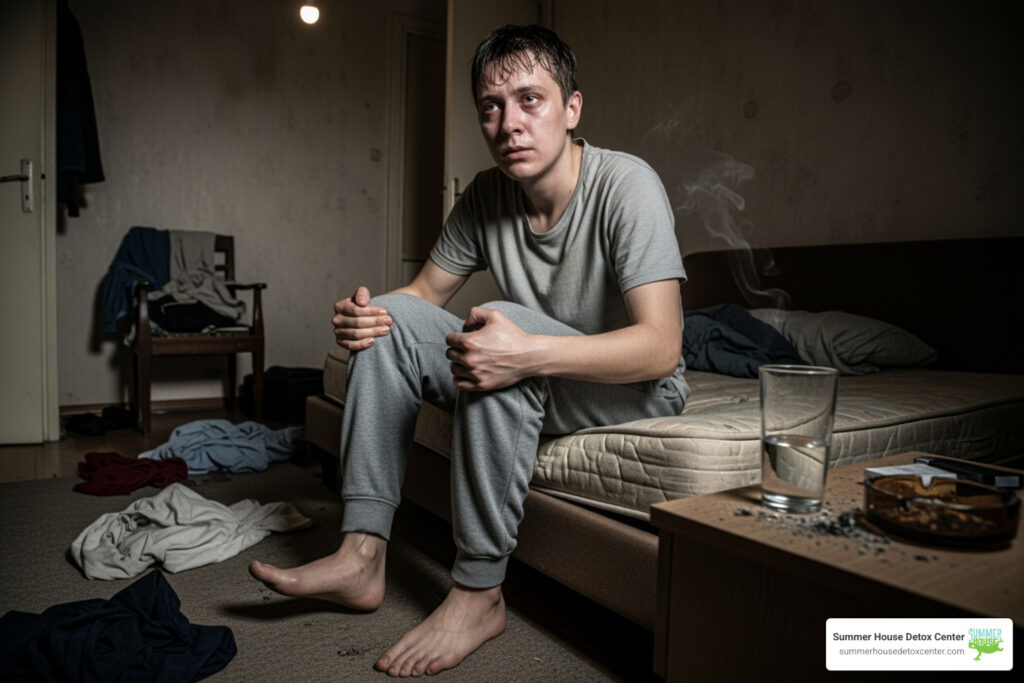Why Professional Support Is Essential for Opiate Withdrawal Recovery
Easing withdrawal symptoms from opiates is possible with medical support and evidence-based treatments. While the process can feel overwhelming, understanding your options helps you confidently take the first step toward recovery.
Quick Answer: Most Effective Ways to Ease Opiate Withdrawal:
- Medically supervised detox – 24/7 monitoring and medication management
- FDA-approved medications – Methadone, buprenorphine, and clonidine
- Symptom-specific treatments – Anti-nausea, pain relief, and sleep aids
- Supportive care – Hydration, nutrition, and comfort measures
- Professional monitoring – Prevents dangerous complications
Statistics reveal the scale of the issue, with millions misusing opioids. For those ready to quit, withdrawal can start within 12 hours, bringing on muscle aches, anxiety, nausea, and insomnia.
The good news? You don’t have to face this alone. Modern medical detox has transformed withdrawal from a dangerous, painful experience into a manageable process. Here in Miami and throughout Florida, specialized detox centers offer proven methods to ease your symptoms safely.
Quitting “cold turkey” at home often leads to unnecessary suffering and high relapse rates. With medical supervision, medications like methadone and buprenorphine can dramatically reduce withdrawal intensity while keeping you safe.
Your comfort and dignity matter. Professional detox manages symptoms and creates a foundation for lasting recovery in a supportive, respectful environment.

Know your easing withdrawal symptoms from opiates terms:
Understanding Opiate Withdrawal: Symptoms and Timeline

During opiate withdrawal, your body is readjusting to functioning without the drugs it has become dependent on. After regular use, the brain rewires itself to expect opiates; stopping them forces the system to recalibrate.
This recalibration process is known as opioid withdrawal syndrome, and it comes with uncomfortable but temporary side effects.
Easing withdrawal symptoms from opiates is more manageable when you understand what’s happening and have the right support. The good news is that these symptoms are temporary, and with proper medical care here in Miami, you don’t have to suffer through them alone.
Factors like the type of opioid used, the amount and duration of use, and your individual body chemistry all influence withdrawal intensity. Everyone’s experience is different, but there are common patterns we can prepare for.
Common Symptoms You Can Expect
Opiate withdrawal often feels like a severe flu combined with overwhelming anxiety. Symptoms typically appear in two waves: early and late.
Early symptoms appear within hours of the last dose. They include agitation, deep muscle aches, and intense anxiety. You may also experience constant tearing, insomnia, a runny nose, sweating, and uncontrollable yawning.
As withdrawal peaks, late symptoms emerge. These include severe abdominal cramping, diarrhea, and dilated pupils causing light sensitivity. You may also experience constant goosebumps (the origin of the term “cold turkey”), along with nausea and vomiting that can lead to dangerous dehydration if not medically managed.
What are the Symptoms of Opiate Withdrawal? provides more detailed information about managing each of these symptoms.
The important thing to remember is that while these symptoms feel overwhelming, they are a sign of your body healing. With medical supervision, we can significantly reduce their intensity and keep you safe.
How Long Does Withdrawal Last?
The withdrawal timeline depends on the opioid used. For short-acting opioids like heroin, symptoms begin within 6 to 12 hours and peak around day 2 or 3, with the acute phase lasting 4 to 10 days.
For long-acting opioids like methadone, withdrawal may not start for up to 30 hours and can last 10 to 20 days or more.
In South Florida, fentanyl withdrawal poses unique challenges. Its potency makes withdrawal unpredictable and severe, underscoring the need for professional medical supervision.
Your individual experience depends on several factors: duration and amount of use, your overall health, and any co-occurring conditions. Your metabolism and age also play roles.
How Long Does It Take to Withdraw From Opiates? breaks down these timelines in more detail.
Understanding your likely timeline isn’t meant to scare you—it’s meant to help you prepare. Knowing what to expect allows you to seek the medical support that will make this process as comfortable and safe as possible. Here in Miami, you have access to experienced professionals who can tailor treatment to your specific situation.
Medically Supervised Detox: The Safest First Step

Quitting opiates “cold turkey” at home is not just painful, it’s dangerous. The severe discomfort often leads to relapse, while complications like dehydration or aspiration can be life-threatening. Medically supervised detox is the safest and most effective first step toward recovery.
The Role of Medically Supervised Detox in Easing Withdrawal Symptoms from Opiates
Medically supervised detox is a process designed to safely clear opiates from your system while minimizing withdrawal symptoms. Medical professionals provide 24/7 monitoring, assess your condition, and administer medications to ensure your safety and comfort.
At a professional detox center like Summer House Detox Center in Miami, FL, we prioritize your safety, comfort, and dignity, making the process as gentle as possible.
- Symptom Management: The principal purpose of supervised withdrawal is to administer medication to reduce the severity of withdrawal symptoms. This means less agitation, anxiety, muscle aches, nausea, and vomiting for you.
- 24/7 Monitoring: Our medical team constantly monitors your progress, ready to intervene if any complications arise. This prevents dangers like severe dehydration or electrolyte disturbances, which can be life-threatening.
- Preventing Complications: We’re equipped to handle potential issues like aspiration (a serious risk if vomiting is severe and unmanaged) and ensure your body remains stable throughout the process.
- Transition to Long-Term Treatment: Supervised withdrawal is primarily a transitional phase, not a standalone cure. It safely moves you towards medication for opioid use disorder (MOUD), such as methadone or buprenorphine, or opioid antagonists like naltrexone. This crucial step sets the stage for sustained recovery. Medically-Assisted Treatment (MAT) is available and often recommended at Summer House Detox Center as part of a comprehensive plan.
- Opiate Detox Program
Supervised withdrawal is not a standalone cure but a critical first step in a comprehensive treatment plan that addresses the root causes of addiction and supports long-term sobriety.
Why Choose a Professional Detox Center in Florida?
The right detox environment is crucial. Florida, and Miami in particular, is a hub for high-quality, specialized addiction treatment.
- Experienced Staff: Our team includes compassionate and experienced medical professionals, many of whom are in recovery themselves. They understand what you’re going through and provide support with empathy and expertise.
- Specialized Care for Fentanyl: Given the complexities of fentanyl withdrawal, our centers are prepared to offer individualized care, even in the absence of specific national guidelines, ensuring you receive the most effective and safe treatment plan.
- Supportive Environment: We provide a clean, comfortable, and serene setting conducive to healing. Far from the triggers and stresses of daily life, you can focus entirely on your recovery. We believe in treating every individual with respect and dignity.
- Transition to Local Aftercare: After detox, the journey continues. We help you transition seamlessly to long-term treatment, therapy, and support systems available right here in Florida, ensuring a continuum of care for lasting sobriety.
- Why Choose Florida for Opiate Detox?
- Opiate Detox Centers: How to Find the Best Support for Your Needs
Medications Used for Easing Withdrawal Symptoms from Opiates
The right medications can make opiate withdrawal manageable. They are tools used by your medical team to target specific symptoms, allowing you to focus on healing.
At Summer House Detox Center, our experienced team creates a personalized medication plan for you, as every withdrawal experience is unique.
| Medication Type | Primary Use | How It Works | Effect on Cravings |
|---|---|---|---|
| Methadone | Relieves severe withdrawal symptoms, long-term maintenance | Full opioid agonist, binds to opioid receptors to prevent withdrawal | Reduces cravings |
| Buprenorphine (e.g., Suboxone) | Treats withdrawal, shortens detox, long-term maintenance | Partial opioid agonist, binds to opioid receptors with less euphoria | Reduces cravings |
| Clonidine | Manages physical symptoms (anxiety, muscle aches, sweating) | Alpha-2 adrenergic agonist, reduces fight-or-flight response | No effect on cravings |
The medications we use are all FDA-approved and backed by years of research. These are proven, safe options that have helped thousands of people successfully steer withdrawal.
Opioid Agonists and Partial Agonists
These medications are key to easing withdrawal symptoms from opiates. They work by interacting with the brain’s opioid receptors in a controlled, therapeutic manner.
Methadone, a full opioid agonist, has been used for decades. It binds to opioid receptors to relieve withdrawal symptoms and reduce cravings without producing a high. It is effective for both detox and long-term maintenance.
Buprenorphine is a partial opioid agonist that eases withdrawal and cravings. It has a “ceiling effect,” meaning its effects level off at higher doses, which reduces the risk of overdose.
Suboxone combines buprenorphine with naloxone, an abuse deterrent. If injected, the naloxone activates and can trigger withdrawal. Taken as prescribed, the buprenorphine works effectively to manage symptoms.
These medications give your body time to heal and readjust while you work on the psychological aspects of recovery. Which Medications Are Used in Opiate Detox? and Does Suboxone Help With Opiate Withdrawal Symptoms? provide more detailed information about how these treatments work.
Non-Opioid Symptom Control
While opioid agonists handle the big picture, we also use targeted medications to address specific uncomfortable symptoms.
Clonidine helps manage the physical symptoms of withdrawal. It calms the overactive nervous system’s “fight or flight” response, reducing anxiety, muscle aches, sweating, and agitation.
While clonidine doesn’t affect cravings, it significantly improves comfort during the physical stages of withdrawal, often helping with sleep and anxiety.
Additional comfort medications prescribed by our medical professionals target specific symptoms as they arise. If you’re dealing with severe nausea, we might use medications like ondansetron. For diarrhea, loperamide can provide relief. Simple medications like acetaminophen can help with muscle aches and any fever you might experience.
Our Miami-based medical team understands that every symptom matters. We’re not just treating withdrawal—we’re treating you as a whole person who deserves dignity and relief.
At-Home Comfort Measures and Potential Risks
While professional medical detox is the safest path, certain at-home comfort measures can support your body during opiate withdrawal. These strategies are part of a comfort toolkit, not a replacement for medical care.
Here’s the honest truth: these supportive measures work best when they’re part of a medically supervised plan. Going it alone at home carries real risks that we need to talk about openly.
Holistic Strategies for Easing Withdrawal Symptoms from Opiates at Home
These simple, nurturing strategies can help your body as it heals, making a real difference in your daily comfort.
Hydration is critical. Withdrawal symptoms like sweating and diarrhea cause fluid loss. Sip water regularly, and consider electrolyte drinks or soothing herbal teas to stay hydrated.
Food provides necessary fuel for recovery. Stick to bland, simple foods like bananas, rice, toast, and applesauce to get nutrients without upsetting your stomach.
Gentle movement, like a slow walk around your Miami neighborhood or light stretching, can help with restless legs and anxiety by releasing natural feel-good chemicals.
Warm baths with Epsom salts can offer temporary relief from muscle aches and tension. The warm water soothes your nervous system while the magnesium may help relax muscles.
Distraction techniques are essential. Watching movies, listening to music, or doing puzzles can help time pass more bearably. Laughter from a comedy can trigger a natural endorphin release.
Breathing exercises and mindfulness are powerful tools for managing anxiety. Deep, slow breathing signals your nervous system to calm down.
How Can I Cope With Insomnia After Opiate Detox?
A Warning on “Natural” and Unproven Remedies
In Florida, many people are tempted by “natural” solutions and easy fixes for withdrawal. These unproven remedies are often ineffective and can be dangerous.
Unregulated supplements like kratom are often promoted for easing withdrawal symptoms from opiates, but kratom itself is addictive and can cause its own withdrawal. It is not FDA-approved, and products may be contaminated, potentially trading one dependency for another.
Online “detox kits” lack scientific backing and can contain unknown or dangerous ingredients that may worsen your symptoms or cause other health issues.
Some herbal remedies can make things worse during withdrawal. Your body is in a delicate state, and adding unproven substances can cause severe side effects.
Herbal Remedies for Opiate Withdrawal Symptoms and Are At Home Opiate Detox Kits Safe? provide more detailed information about these risks.
Evidence-based treatment isn’t just medical jargon—it’s your safety net. Your health is too important to gamble on unproven remedies. Professional medical supervision is the only reliable way to ensure your safety and comfort during withdrawal.
If you’re in Miami or anywhere in Florida, please reach out to medical professionals before trying any home remedies or detox products.
Life After Withdrawal: Managing Risks and Embracing Recovery
Completing detox is a major achievement, but it’s the first step, not the final destination. The weeks and months that follow have unique challenges, and preparation is key to long-term success.
Think of detox as clearing an infected wound—it’s necessary, but the real healing happens afterward. Your body is free from opiates, but your brain is still adjusting. This period requires patience, support, and awareness of the risks ahead.
The Critical Danger of Post-Detox Overdose
It’s critical to understand a life-saving fact: the risk of a fatal overdose is highest immediately following detox. Knowledge of this risk is key to staying safe.
During active use, your body builds a high tolerance to opiates. Detox dramatically lowers this tolerance, resetting your body’s response to the drugs.
Your lowered tolerance means that a post-detox relapse, even with a previously “normal” dose, can be lethal because your body can no longer handle it.
This is why having naloxone (Narcan) is crucial. This medication can reverse an opioid overdose and is widely available in Miami and throughout Florida, often without a prescription. Many community organizations also offer free training and kits.
Harm reduction isn’t about encouraging drug use—it’s about keeping you alive. Having naloxone nearby and ensuring loved ones know how to use it is a smart safety measure.
Building a Foundation for Lasting Sobriety
Easing withdrawal symptoms from opiates was the first step; now you can build a life you love in recovery. True healing must address the mind, body, and spirit.
Ongoing therapy is your toolkit for navigating life’s challenges. Individual counseling helps you develop healthy coping strategies, while group therapy connects you with peers who understand.
South Florida has a vibrant support group community. Narcotics Anonymous (NA) and SMART Recovery meetings are available throughout Miami, offering different approaches to peer support.
Family involvement can transform your recovery. Family therapy helps heal relationships, improve communication, and build a stronger support network at home.
Many people also struggle with co-occurring mental health conditions like depression or anxiety. Addressing both addiction and any underlying mental health issues together offers the best chance for lasting recovery.
Creating a new life in Miami and throughout Florida means finding joy beyond substances. Whether it’s enjoying the beach, joining local groups, or exploring the culture, recovery is about what you gain, not just what you give up.
The key is to stay open to new experiences and be patient with yourself. Asking for help is a sign of wisdom. Reach out to your support team whenever you feel overwhelmed—that’s what they’re there for.
Conclusion
Recovery from opiate dependence is possible and begins with easing withdrawal symptoms from opiates. While this first step can feel overwhelming, you do not have to face it alone.
The difference between withdrawing alone and with professional support is night and day. A dangerous, agonizing experience becomes safe and manageable with medical supervision. Medically supervised detox keeps you safe and allows you to focus on healing without unnecessary suffering.
Detox is the foundation, not the final destination. Long-term success is built on ongoing support, therapy, and a daily commitment to a fulfilling, substance-free life.
At Summer House Detox Center in Miami, we treat every person as an individual. Our experienced team, many in recovery themselves, understands your journey. We provide compassionate care that addresses both your physical and emotional well-being for true, lasting healing.
Miami and Florida offer a unique setting for a fresh start. The climate, community resources, and our commitment to connecting you with local aftercare help you build a new life designed for success.
A healthier future is a real possibility that starts with one decision. We are here to support you every step of the way, from your first call to lasting sobriety.
Start Your Recovery Journey at Our Miami Opiate Detox Center

